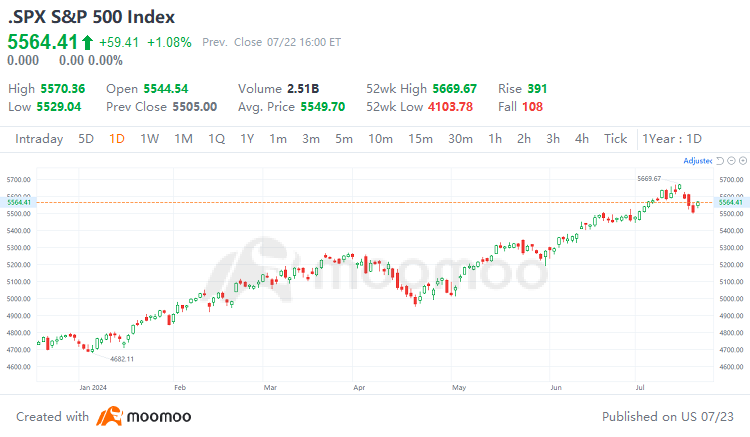US Stocks Face Risk Signals: Tech Valuation Timebomb and Slower Economic Growth
Despite a recent pullback, the $S&P 500 Index (.SPX.US)$, propelled by tech stocks, has risen over 15% so far this year. However, the stock market is flashing warning signs that the tech stock frenzy is about to end, according to one of Wall Street's most bearish analysts.

Albert Edwards, the chief global strategist for Societe Generale, issued another warning about the blistering 2024 stock rally in a note on Thursday. Tech valuations are the big signal that something has to give. The sector has swelled to 35% of the total S&P 500. That's the highest portion tech stocks have accounted for in the benchmark index since the early 2000s.
Tech valuations are an overstretched “time bomb”
Wall Street still has lofty expectations for tech earnings. Analysts are expecting tech stocks to post forward earnings growth of around 30% year-over-year, Edwards noted, though tech stocks have actually been posting around 20% yearly earnings growth.

Analysts quickly took notice of the earnings gap. The $NASDAQ 100 Index (.NDX.US)$ saw a significant decrease in earnings per share upgrades, while the $S&P 500 Index (.SPX.US)$ and $Russell 2000 Index (.RUT.US)$ experienced increases in their upgrades.

The forward price-to-earnings ratio of the tech sector also looks "stretched," with the sector being priced around 32 times forward earnings estimates. That compares to the S&P 500, where the price-to-earnings ratio is hovering just above 20 — something that points to a "ticking IT valuation timebomb," Edwards said.
Corporate earnings also look poised to weaken later this year, Morgan Stanley's chief stock strategist said, predicting that stocks could soon see as much as a 10% pullback.
Additionally, a team of senior investment strategists at John Hancock Investment Management has pointed out that tech stocks currently have a PEG ratio of 1.39, compared with 1.27 for the S&P 500 as a whole. The PEG ratio adjusts price-to-earnings for how much earnings are expected to grow over time.
Looking ahead, businesses expected the slowing to continue
The US economy grew at a slight pace heading into the third quarter, with a number of regions noting flat or declining activity, the Federal Reserve said in its Beige Book survey of regional business contacts.
“Expectations for the future of the economy were for slower growth over the next six months due to uncertainty around the upcoming election, domestic policy, geopolitical conflict, and inflation,” the report said.
Wages grew at a modest to moderate pace in most districts, though prices rose modestly overall. Consumer spending showed little to no change.
Nearly every district “mentioned retailers discounting items or price-sensitive consumers only purchasing essentials, trading down in quality, buying fewer items, or shopping around for the best deals,” the report said.
In addition, the Conference Board’s leading economic index fell slightly in June, by 0.2%, following an upwardly revised 0.4% drop in May. “The US LEI continued to trend down in June,” Justyna Zabinska-La Monica, senior manager of business cycle indicators at the business organization, said in a statement. “The decline continued to be fueled by gloomy consumer expectations, weak new orders, negative interest rate spread, and an increased number of initial claims for unemployment.”
"June’s data suggest that economic activity is likely to continue to lose momentum in the months ahead. We currently forecast that cooling consumer spending will push US GDP growth down to around 1% (annualized) in Q3 of this year.”Zabinska-La Monica added.
Considering whether valuations are too dangerous? Tap to quickly check the Company's Valuation>

Source: Yahoo Finance, Societe Generale, Bloomberg
Disclaimer: Moomoo Technologies Inc. is providing this content for information and educational use only.
Read more
Comment
Sign in to post a comment

rusli : $MAYBANK (1155.MY)$
70710385 rusli : help jesus name Damien savings is god of all gods from heaven amen
White_Shadow : the tide is starting to change
smoothshoe : Bearish analysts are always looking for and often find "negative signals." It called pareidolia bias.
A Humble Mooer : hilariously bad arguments here.
the first part of the article speculates that the tech sector known for its pricing power and monopolies and historically sky high valuations might not increase gains.
And the evidence? soft retail sales and US regional weakness
Oneironaut88 70710385 : What?
Oneironaut88 : Tech EPS is usually higher than the rest of the market. Nothing changed, except sentiment.
Buddhist Jesus 70710385 : you called? i answer